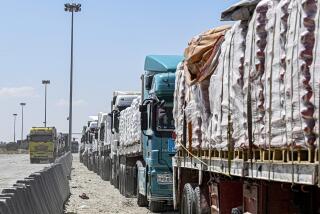U.S. Delays Taking Sides as Cambodian Factions Battle
- Share via
WASHINGTON — With Cambodia’s uneasy political coalition in shambles after two days of heavy fighting in the capital, Phnom Penh, U.S. officials on Monday delayed choosing sides in the crisis in hopes of salvaging portions of the international agreement that, until now, brought a brief peace to the beleaguered Asian nation.
That peace ended Saturday when forces loyal to one of the country’s two prime ministers, Hun Sen, seized key military strongholds that had been loyal to Prince Norodom Ranariddh, Hun Sen’s political rival and reluctant coalition partner. Under Cambodia’s complicated political framework, Ranariddh carried the title of first prime minister.
Despite evidence that Hun Sen’s forces launched the attempt to oust his rival, who is now in France, State Department spokesman Nicholas Burns repeatedly stressed that the U.S. was not yet prepared to take sides in the crisis.
Hun Sen has claimed he acted only after seeing evidence that Ranariddh had secretly joined forces with the Communist Khmer Rouge guerrillas, responsible for the slaughter of more than a million Cambodians when they ruled the country in the 1970s.
“We prefer to continue our consultations with both political parties today in Phnom Penh and with our allies, before we are able to make that kind of a final judgment--that the Paris peace accords have been ruptured,” Burns said.
The other nations that have poured billions of dollars into Cambodia since the 1991 U.N.-sponsored peace accords are taking a similar wait-and-see attitude. That includes Japan, which has been the largest single aid donor to Cambodia, and the Assn. of Southeast Asian Nations.
The seven-nation association had been scheduled to admit Cambodia on July 23. However, ASEAN’s foreign ministers are scheduled to meet Thursday in the Malaysian capital, Kuala Lumpur, to reassess that decision. Ranariddh and Khmer Nation Party leader Sam Rainsy, who is also in France, have called on the international community not to recognize a Hun Sen-controlled government.
The 1991 U.N.-sponsored peace conference in Paris created a democratic framework for Cambodia that led to national elections two years later. Ranariddh’s party won power, but, in the interests of political stability, he agreed to enter a coalition with Hun Sen, who took on the title of second prime minister.
In a radio broadcast Sunday evening, Hun Sen rejected a mediation offer from Ranariddh’s father, Cambodia’s King Norodom Sihanouk, as unnecessary, declaring, “Everything is over.”
Speaking from the southern French town of Aix-en-Provence after fleeing Phnom Penh on Friday, Ranariddh appeared equally uncompromising, telling the Reuters news agency that he planned to organize resistance against his rival.
Burns called on Cambodian authorities in the capital to prevent further unrest. He also said there was no plan at present to evacuate any of the estimated 1,500 Americans in Cambodia.
*
International organizations involved in Cambodia also hesitated to assign political responsibility for the recent events, which one human rights advocate called “still so fluid and unclear that it’s hard to know who’s behind what.”
In an attempt to clarify the situation and study policy options, U.S. Undersecretary of State for Political Affairs Thomas Pickering met Monday in Washington with ambassadors from the ASEAN nations.
Regardless of how the present situation is eventually resolved, the convulsion constitutes a serious and damaging setback to Cambodia’s struggle for political and economic recovery.
International donors who only last week at a meeting in Paris pledged $450 million in new development assistance this year coupled that commitment with the warning that continued cooperation between the two rival leaders was essential.
Times staff writer Sonni Efron in Tokyo contributed to this report.
More to Read
Sign up for Essential California
The most important California stories and recommendations in your inbox every morning.
You may occasionally receive promotional content from the Los Angeles Times.










